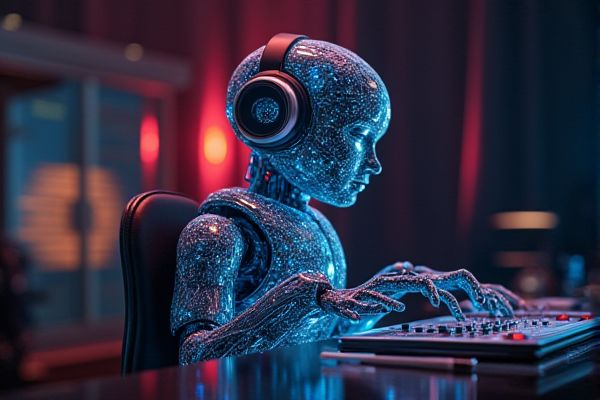
AI technology is revolutionizing the music industry by enabling artists to compose, produce, and refine their sound in innovative ways. Machine learning algorithms analyze vast libraries of music, identifying patterns and styles that inspire new compositions tailored to listener preferences. AI-driven tools assist in areas such as lyric writing, sound engineering, and even generating melodies, providing musicians with creative support. The integration of AI also facilitates personalized music recommendations, enhancing the listening experience and connecting fans with artists in deeper ways.
AI usage in music
Creative Composition
AI can enhance creative composition by generating original musical ideas based on existing styles and trends. Tools like OpenAI's MuseNet allow musicians to explore a variety of genres and influences, potentially expanding their creative boundaries. This technology can analyze patterns in music, suggesting chord progressions or melodies that a composer might not have considered. By incorporating AI into their workflow, artists may discover new avenues for inspiration and innovation in their work.
Music Recommendation Systems
AI in music can enhance user experience by providing personalized song recommendations based on listening habits. For instance, platforms like Spotify leverage algorithms to analyze user preferences and suggest tracks that align with their taste. This technology can lead to discovering new artists and genres that users might not explore otherwise. The potential for increased user engagement and satisfaction remains a significant advantage in the evolving music industry.
Music Production Tools
AI usage in music production tools can enhance creativity by providing new ways to compose and arrange songs. Software like Logic Pro integrates AI to suggest chord progressions and melodies, allowing artists to explore different musical avenues. The ability to automate repetitive tasks may increase productivity for sound engineers and producers alike. This technological shift presents opportunities for musicians to focus on artistic expression rather than technical limitations.
Sound Design Automation
AI's use in music and sound design automation can significantly enhance creativity and productivity. Tools like OpenAI's MuseNet can generate unique compositions, allowing musicians to experiment with new sounds and styles. Automation processes can streamline repetitive tasks, giving artists more time to focus on innovation and artistic expression. The possibility of AI collaboration may also lead to the emergence of novel genres and soundscapes in the music industry.
Lyric Generation
AI tools have the potential to transform music by assisting in lyric generation. For instance, platforms like OpenAI's ChatGPT can create unique song lyrics based on given themes or styles, offering artists a fresh source of inspiration. This technology may also streamline the songwriting process, giving musicians a chance to enhance their creative output. With continuous advancements, the ability of AI to craft compelling narratives in lyrics could lead to innovative musical expressions.
Music Personalization
AI can enhance music personalization by analyzing individual listening habits and preferences. Platforms like Spotify utilize algorithms to curate playlists tailored to each user. This technology can predict songs that a listener may enjoy, improving user experience and engagement. The chance for artists to reach wider audiences increases as AI helps identify and target niche markets.
Audio Restoration
AI in music offers opportunities for enhanced audio restoration, significantly improving sound quality in older recordings. The technology can identify and eliminate background noise, clicks, and other imperfections, making it applicable in fields like audio engineering. For instance, music institutions such as Berklee College of Music explore AI tools to revitalize archival recordings. This potential for restoration can lead to a richer listening experience for audiences and preserve musical heritage.
Algorithmic DJing
Algorithmic DJing utilizes AI to select and mix tracks based on real-time audience reactions and preferences. This technology can enhance live performances by creating dynamic playlists that adapt to the crowd's energy. For instance, platforms like Spotify leverage algorithms to recommend songs that suit a listener's taste, potentially increasing engagement. The likelihood of engaging audiences through personalized experiences suggests a significant advantage for artists and event organizers.
Real-Time Music Interactivity
AI usage in music enhances real-time music interactivity, allowing creators to respond dynamically to audience input. For example, a music app can adapt its composition based on user engagement, increasing listener enjoyment. This capability offers artists a chance to explore new collaborative methods while engaging fans more deeply. Implementing AI tools can potentially lead to innovative musical experiences, benefiting both musicians and audiences alike.
Artist Collaboration Platforms
AI usage in music can enhance creativity by generating new compositions or assisting in production, allowing artists to explore fresh sounds. Artist collaboration platforms, such as Splice, offer opportunities for musicians to connect and create collaboratively, broadening their reach and influence. The possibility of AI-driven insights can help artists identify trends and audience preferences, optimizing their work for commercial success. This technology may also streamline the songwriting process, making it easier for artists to bring their ideas to fruition.
 techknowy.com
techknowy.com